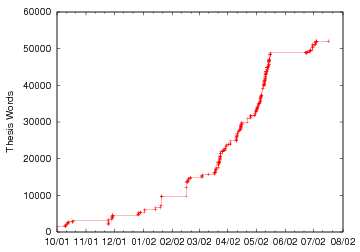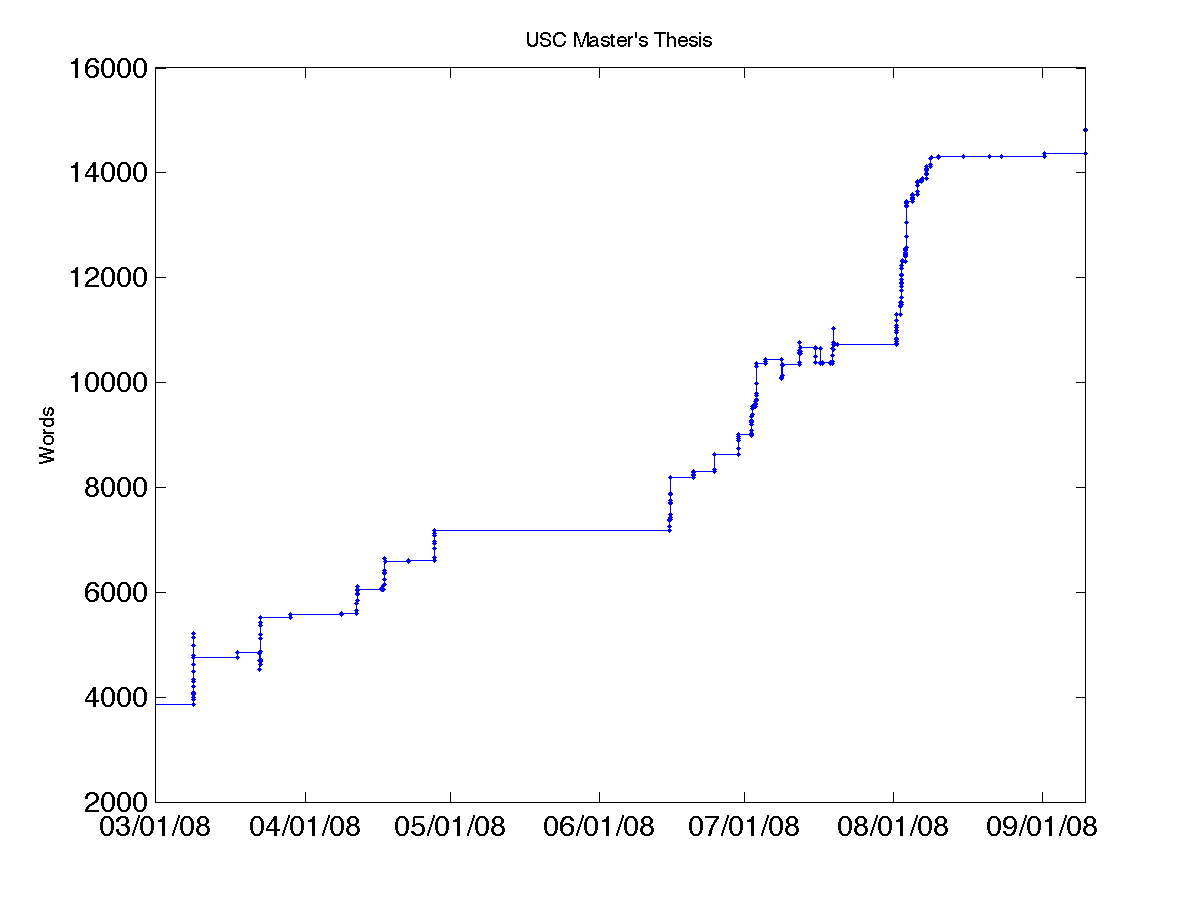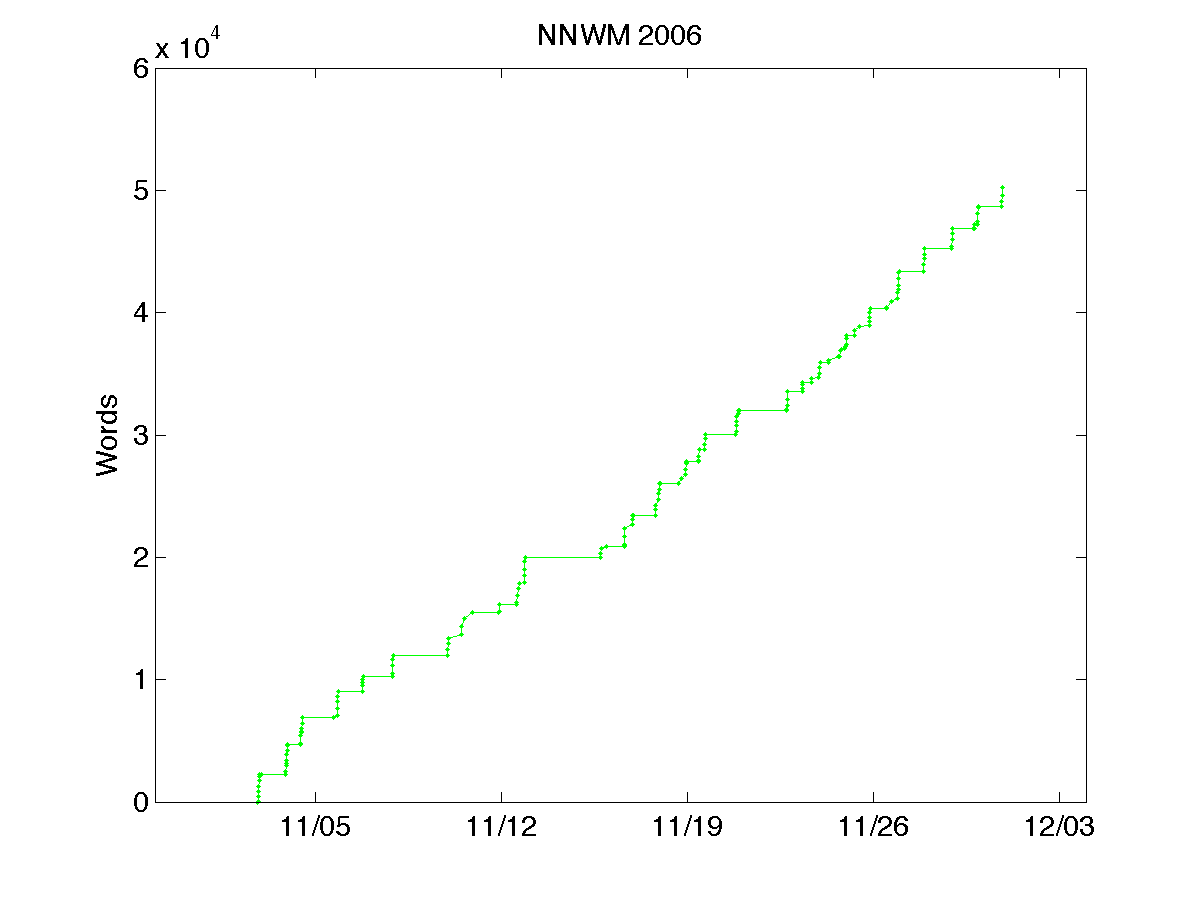I’ve tackled a few large writing projects over the past few years. Because I am a geek, I wrote a script that tallied the number of words I’d written every 15 minutes during each project. Because I am a scientist, I’ve analyzed the results and determined that, in each case, very different behavior is evident.
Among other things, writing my dissertation in 2001-2002 was an exercise in pure, undiluted focus. For several months, I did little but wake up, eat, write, sleep, repeat and repeat and repeat.

There are some gaps in November and December due to working on job applications and otherwise being distracted. The gap in February occurred when I fell victim to some horrible contagion that had me flat on my back for days, stole my voice, and forced me to reschedule a job interview. But from March to mid-May, it was smooth sailing. As my deadline approached, you can see the slope increasing until, near the end of May, I submitted the dissertation to my committee members for their review. I defended in June, made some revisions, and finally Phinished in July.
However, that smooth exponential behavior was not observed while working on my Master’s thesis in 2008:

Progress occurred in a very discontinuous way, because this time I was fitting writing time around my work schedule, mostly on weekends. I learned first-hand how hard it is to write a large document when each time you return to it, you have to invest significant effort in re-acquiring your train of thought. (The large gap in late May cannot, however, be blamed on work, and was instead due to a fabulous trip to Japan.) Writing also had to compete with
coursework for my attention until early May. But it wasn’t only the time constraints that slowed me down. My job already involves a lot of technical writing, and I often found that at the end of the day the writing part of me felt drained dry, with little left over for more technical composition. Sure, the dissertation was much longer than the thesis… but sometimes it felt like writing the thesis took even more determination and willpower to bring it into being.
It’s interesting to contrast both of these to my productivity during November 2006, in which I tackled a work of fiction. National Novel Writing Month challenges you to write 50,000 words in 30 days. Now, my dissertation was just over 50,000 words, so I knew it was theoretically possible–except that I’d had much more than a month to write it. Of course, writing fiction is a whole different ballgame, unfettered by factual reporting and experimental results. Since the goal is to produce a certain number of words, rather than a coherent document about a research project, it’s much easier to break it down into equally sized daily word count targets, which we see reflected in the plot:

This one is much better fit by a linear trend than an exponential one, indicating almost no procrastination that would otherwise necessitate a final push. But “procrastination” is a deceptive term. Exponential productivity in writing a thesis or dissertation is not necessarily a result of procrastination; you can’t really split up the final goal into tiny daily chunks because it’s hard (or impossible) to define what the final product should look like until you’re already there. Outlines are helpful, but no one can predict how many words it will take to address each point you need to make. Overall, I learned that if the goal is raw, regular productivity, then I can meet it, at least for a month (even working around a full-time job and the hardest class I ever took at USC!). On the other hand, if I’m attempting thoughtful, substantial, technical composition, then I do best with solid uninterrupted chunks of time. This definitely isn’t a place where I can work wonders while multitasking!



